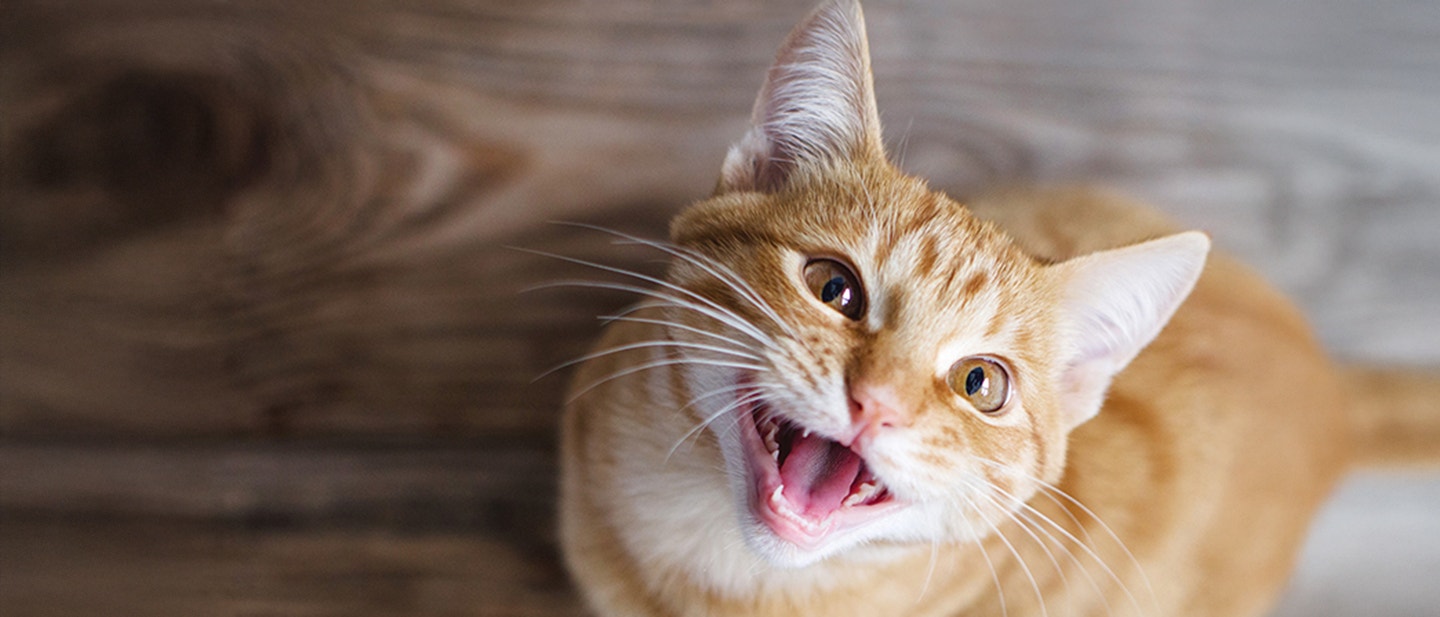
WHY IS MY CAT MEOWING SO MUCH?

Article checked by a vet
Meowing in cats is a perfectly natural method of communicating with you.
If your cat is meowing and is healthy, active, and comfortable, they are often just trying to get your attention.
That's because they enjoy your company or need a door opening, a few treats, a groom, a game, or a cuddle.
Dealing with your cat's excessive meowing can be a source of frustration and worry for cat parents. Rest assured, you are not alone among pet parents in this situation.
Cats meow as a means of communication, but they employ a variety of tones and pitches to convey their wants, feelings, and needs.
But if your cat begins to make these noises more frequently than normal, it may indicate something is wrong. Or, alternatively your feline friend might be trying to get your attention for a number of different reasons.
Hunger, an unclean litter box, or more significant problems related to stress or health might be at the root of the problem. If your cat is meowing excessively, the first step in stopping it is to figure out why.
In this post, we'll discuss how to read your cat’s mood, some typical causes of excessive meowing, when to be concerned, and what you can do as a cat parent to deal with it.
Why Is My Cat So Vocal, and What Does It Mean
There are a lot of explanations as to why your cat is meowing constantly. Sometimes, they just want to play with you or want their favourite treat so badly.
However, there are times when excessive vocals could be a medical or environmental concern. So, let's look at ten reasons why your cat could be meowing excessively.
10 common reasons why your cat is meowing constantly?
As we said earlier, there are a number of possible causes for your cat to meow excessively.
Behavioural Reasons
- Hunger or Thirst: If your cat's bowls of food or water are completely empty, it may meow to signal that it is hungry or thirsty. Ensure fresh food and water are always available, and consider referring to our guide, "How much should a cat eat?", for information on proper feeding schedules.
- Needs attention: Cats meow a lot when they're lonely or when they feel unappreciated, so it's possible that your cat is trying to get your attention. Engaging in more playtime with your feline friend can help avoid this situation. Toys or games for cats could be useful. Additionally, cuddling more frequently is a great way to show affection and strengthen your friendship.
- Your cat is in season: The word "heat" describes a recurring part of the reproductive cycle in unspayed female cats. If your cat has not been spayed, she will experience heat cycles throughout her adult life, where she may exhibit behaviours like yowling to attract potential mates. These cycles typically occur during the cat mating season.
Environmental Reasons
- New surroundings or changes: Sometimes, when you make changes, it takes time for your cat to readjust. It could be that you moved to a new home, the one you live in is being renovated, you brought a new pet to the home, or you just had a baby. Your cat can start meowing excessively due to changes like these. The best way around this is to gradually introduce changes in your home.
- Your cat wants to be let outside: This is also one of the common reasons for excessive meowing in cats. The cat is trying to tell you they want to be let out. For example, it will take a while if you’ve always allowed your cat to spend more time outside but later decide to train it to be indoors. If your pet is always meowing close to the door or window, they just want to go out.
Medical Reasons
- Discomfort and stress: If you notice your cat's meowing is new or unusual, and you can also see some changes in their behaviour, it can be that they are seeking attention or as an indication of a health issue, pain, stress or discomfort, like a cat digestive problem. Consult your vet if your cat is stressed.
Hyperthyroidism: This common condition in older cats makes them feel hungry and restless and often meow excessively. You should take your cat to the vet to diagnose this.
Also, read our blog on other health problems that may affect your cat, leading them to vocalise.
- Cognitive Decline: If you have an older cat, they can develop a form of dementia that causes disorientation, confusion, and increased meowing. If you suspect your senior cat has a cognitive decline, consult your vet for solutions.
- Sensory Decline: Just like humans sometimes suffer from hearing and sight problems, your cat's sight or hearing may become disoriented, leading to excessive meowing. You need to visit a vet when you notice your cat is having difficulty locating his familiar play toys or often bumping into objects in your home.
- Your kitten is teething: Kittens meow more often than usual while teething because of discomfort. You should read our article, "Signs your kitten is teething," so you know what to do as a cat parent.
After spaying or neutering, these hormonal meows usually decrease. However, individual personalities can influence vocal tendencies; some cats may naturally meow more than others, regardless of gender.
Also, cats vocalise when they are in season or in heat but also when in conflict with other cats, either marking their territory or fighting with neighbouring cats.
Cats also meow as a way of communicating with their human family. Some breeds of cats vocalise more than others, but most will meow as a friendly greeting when they see you or if they want you to do something for them!
Additionally, it is important to speak with a vet to eliminate any possible health issues. You might consider using positive learning techniques if your cat is meowing excessively.
Climbing structures, interactive toys, and a secure outdoor area can keep your cat occupied all day long, which is especially helpful if it gets bored fast.
When should I be worried about excessive meowing?
You, the cat parent, should immediately notice any deviation from your cat's typical meowing pattern. An indication of distress in cats can be a sudden increase in meowing or a change in the pitch or tone of their meows.
If this excessive meowing happens when your pet engages in regular activities with which it has no trouble, you should investigate it to find out why.
Things like eating, using the litter box, and grooming might fall within this category. These alterations may point to a more serious problem linked to health issues, pain or stress-related concerns.
You should also pay attention to additional signs, such as sleepiness, changes in appetite, or strange behaviours, that may accompany the excessive meowing.
As a cat parent, you should listen to your instincts; after all, you are the one who knows your pet best.
Your cat may try to communicate with you through increased meowing when something is wrong. Always consult your vet if you see any significant changes in your cat's behaviour. The vet will examine your feline friend to determine the cause and provide treatment options.
If you're concerned about keeping your cat healthy, visit our cat food page. Our page has information on good nutrition for cats of all ages and life-styles.
Conclusion
As we have covered in this article there are a variety of different reasons why your cat will meow, from seeking your attention and affection to more serious reasons. To be able to truly answer the question of “why is my cat meowing so much” will require observation and potential consultation with your vet to understand and potentially diagnose issues that are causing prolonged vocalisation. However in most cases meowing is not a cause for concern and pet parents needn't worry.
